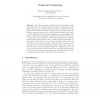Free Online Productivity Tools
i2Speak
i2Symbol
i2OCR
iTex2Img
iWeb2Print
iWeb2Shot
i2Type
iPdf2Split
iPdf2Merge
i2Bopomofo
i2Arabic
i2Style
i2Image
i2PDF
iLatex2Rtf
Sci2ools
CC
2010
Springer
2010
Springer
Punctual Coalescing
Compilers use register coalescing to avoid generating code for copy instructions. For architectures with register aliasing such as x86, Smith, Ramsey, and Holloway (2004) presented a polynomial-time approach, while Scholz and Eckstein (2002) presented an optimal, exponential-time approach together with a near-optimal, quadratic-time heuristic. Both methods scale poorly after aggressive live range splitting, especially for programs in elementary form where live ranges are split at every program point. In contrast, we mentioned in a previous paper (2008), without giving details, that we have a scalable, linear-time heuristic for programs in elementary form. In an effort to formalize that heuristic, we discovered an even better algorithm, called Punctual Coalescing, which we present here. Punctual Coalescing is scalable, linear time, locally optimal in general, close to globally optimal for straight-line code, and proven correct with the Twelf theorem prover. We define global optimality...
| Added | 18 May 2010 |
| Updated | 18 May 2010 |
| Type | Conference |
| Year | 2010 |
| Where | CC |
| Authors | Fernando Magno Quintão Pereira, Jens Palsberg |
Comments (0)

